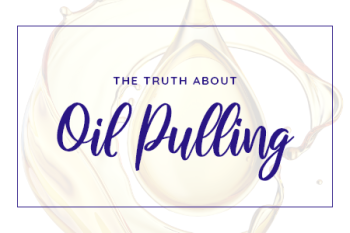What is the Truth About Oil Pulling?
 Coconut oil continues to make waves in the health world. From cooking to skincare, it’s often touted as a cure-all for a variety of health concerns. One area where coconut oil has gained popularity is in oral health. Unless you’ve been living under a rock, you’ve probably heard a friend, family member, hairdresser, or even an Uber driver rave about the benefits of oil pulling.
Coconut oil continues to make waves in the health world. From cooking to skincare, it’s often touted as a cure-all for a variety of health concerns. One area where coconut oil has gained popularity is in oral health. Unless you’ve been living under a rock, you’ve probably heard a friend, family member, hairdresser, or even an Uber driver rave about the benefits of oil pulling.
But is oil pulling really all it’s cracked up to be? As your trusted dental professionals, we recommend getting a thorough dental exam before starting any alternative treatment. Make sure you’re up to date on your re-care appointments!
What Is Oil Pulling?
Oil pulling originated in India and Southern Asia. It involves swishing about a tablespoon of edible oil in your mouth for several minutes before spitting it out.
A 2015 study published in the Nigerian Medical Journal found that people who practiced oil pulling regularly experienced a reduction in plaque formation. However, the study and other experts note a lack of definitive research supporting the benefits of oil pulling.
The American Dental Association (ADA) does not recommend oil pulling. The ADA states there is no scientific evidence linking oil pulling to teeth whitening, cavity prevention, or improved overall health.
Is Oil Pulling Safe?
If you’re considering trying oil pulling based on anecdotes from friends or online sources, proceed with caution—and always consult your dentist first.
Some things to watch out for:
- You may experience an upset stomach or diarrhea.
- Some individuals have allergic reactions to certain oils. Whether you use coconut, sunflower, or sesame oil, check the full ingredient list and make sure you’re not allergic.
- Be careful not to ingest the oil during or after swishing, as it may contain bacteria and toxins from your mouth. Ingesting too much fatty oil could also lead to elevated cholesterol.
Most importantly, don’t replace your standard oral hygiene routine with oil pulling. The ADA—and your dentist—advocate for time-tested methods: brushing twice daily and flossing once a day. These are proven practices for a reason.
What Else Can I Do for Teeth Whitening, Cavity Prevention, and Gum Health?
Coconut oil gets a lot of attention from those seeking natural ways to whiten teeth and improve gum health. However, there is no scientific research to support those claims. So, what are your options?
Teeth Whitening in the Dental Office
If a brighter smile is what you’re after, we can help! Our in-office teeth whitening is safe, affordable, and—best of all—overseen by dental professionals who know it works. Whether you’re interested in professional in-office treatment or take-home options, we’ll help you find a solution that works for you.
Cavity Prevention
Cavity prevention is one of our top priorities. While swishing with coconut oil may sound appealing, the most effective way to keep cavities at bay is to:
- Understand your personal risk factors
- Maintain good oral hygiene habits (brush and floss!)
- Visit your dentist regularly
Gum Health
Healthy gums are essential for overall oral health. If you notice early signs of gingivitis, such as bleeding when brushing or flossing, redness, or swelling, come see us. We have many tools to help you manage and improve your gum health. And if you’re considering oil pulling as a solution, be sure to talk with us first.
Swishing with oil likely won’t cause harm (unless you’re allergic or accidentally swallow it), but it probably won’t do much good either. It would be great if there were a miracle oil to guarantee a healthy mouth—but for now, your best bet is still brushing, flossing, and visiting your dentist regularly.
Please call A Smile by Design, and we will be happy to help!
Disclaimer: The content of this blog is not intended to be a substitute for professional medical advice, diagnosis, or treatment. Always seek the advice of qualified health providers with any questions you may have regarding medical conditions.











